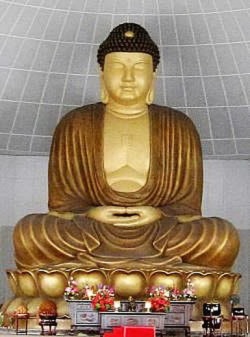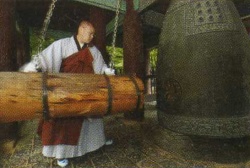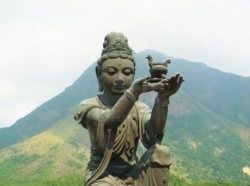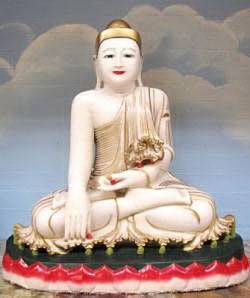Dhammācariya
<poem> Dhammācariya (dhamma teacher)
Entrance Examination
Monks, who wish to study at the University, first have to sit for the entrance examination.[4] In the format of the entrance examination there will be:
(1) 4 questions on Vinaya, Suttanta and Abhidhamma,
(2) 4 questions on General Knowledge (to be taken in a day)
A session of personal interview will follow the next day. Only applicants who pass the entrance examination will be accepted, and the University will be wholly responsible for the accommodation, food and health of the student monks.
Starting from academic year 2006 (1368-1369 ME), with the aim of upgrading the quality of examination, the format of the entrance examination has been changed; thus there are now:
(1) 4 English questions corresponding to Basic Education Higher level,
(2) 4 questions on Pāḷi language,
(3) 4 General knowledge questions on Vinaya, Suttanta and Abhidhamma, in three days, one paper to be answered each day,
(4) personal interview.
Sâsanatakkasīla Dhammācariya (B.A. Buddhism) Degree
- Student monks have to study for 4 years for the degree of Sāsanatakkasīla Dhammācariya[5], and as a part of their course are required:
(1) to attend a month's course on indigenous medicine,
(2) to write a term paper of 60 to 100 pages,
(3) to attend 10-day course meditation practice.
Sâsanatakkasîla Mahâdhammâcariya (M.A. Buddhism) Degree
The following criteria are used to select candidates for the above degree:
(1) 75 percent of maximum marks given is to be scored in the examinations of First, Second, Third and midterm and final examination of fourth year.
(2) Good moral behaviour in the fourth academic year.
For Sâsanatakkasîla Mahâdhammâcariya Degree the term fixed is 2 years, and during this term of two years, the basis of the course is the three Pitakas, Vinaya, Suttanta and Abhidhamma, together with subjects such as Myanmar, English, Pâéi and Propagation of Sâsana. Major subject of study is selected for the candidates based on their marks scored in the 4th year examination on Pitaka subjects, Vinaya, Suttanta and Abhidhamma.
To help in thesis writing for the degree, candidate monks are divided into small groups of four or five to write a short thesis in their first year of Master's program. That thesis must be within the range of 60 to 100 pages, and in the second year this short thesis becomes the seminar topic. After completing the two-year course, the candidates have to go for 45-day meditation practice at the Mahasi Meditation Centre. After the meditation practice, the candidate must write a thesis in three years for the bachelor's degree. And after submission of the thesis, the candidate must serve in the missionary service for two years at the border areas and remote highlands. Those candidates who work at the University must serve three years, and after completion of the respective services, the candidates will be conferred the degree of Sâsanatakkasîla Mahâdhammâcariya.
In the Sâsanatakkasîla Mahâdhammâcariya course, Pārājikakaṭṭha, Sīlakkhandha, Aṭṭhasālinī texts are taught in modern perspective, with precis-writing, and seminars.
In the First and Second Year of Sâsanatakkasîla Mahâdhammâcariya the following texts are taught:
For candidates majoring in Vinaya- all the texts of Vinaya; for candidates majoring in Suttanta - all the texts of Suttanta; for candidates majoring in Abhidhamma - all the texts of Sammohavinodanî Commentary together with Pañcapakaraṇa Commentary subjects such as Myanmar, English, Pāḷi and Sanskrit and History. To write thesis for the bachelor's degree, the candidates have the right to choose any topic from the Three Piṭakas.
In 2004 a Ph.D (Dhamma Pāragū) programme was initiated at the State Pariyatti Sāsana University, and as a preliminary course a one-year Intensive English Course was started. It was taught by teachers from the University of Foreign Languages as an act of merit (Paññâ Dāna). Examinations are held every six months. The same preliminary course was also started in Mandalay. The candidates who successfully completed the Intensive English Course are accepted for the Ph.D programme and candidates are taught by Prof. U Myint Swe, M.A. (London).



